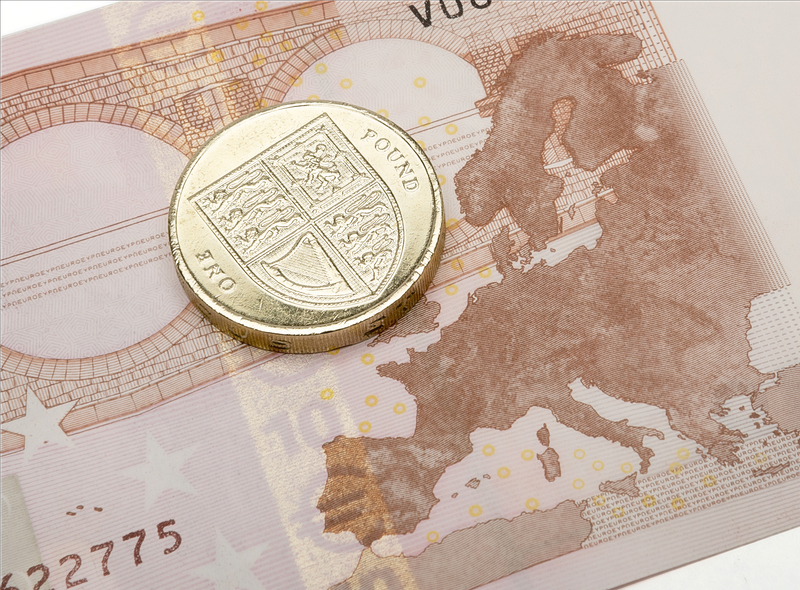With just a fortnight until the Brexit referendum, what is the final push doing to the pound?
- Pound-dollar exchange rate down by 2.1% between 26 May and 3 June (easyMarkets)
- A Brexit may shave 3.5% off UK GDP by 2020 (Institute for Fiscal Studies)
- Euro-pound exchange rate rising sharply, a sign of things to come should Brexit occur (easyMarkets)
Britain’s European Union (EU) referendum debate shifted into high gear last week when the pro-Brexit campaign took the lead in the polls for the first time ever. The British pound was one of the biggest casualties, a trend expected to continue should voters continue to lean in favour of Leave.
After months of campaigning, Brexit appeared to be a long shot, with Prime Minister David Cameron’s Remain camp holding sway in virtually every poll. That changed last week when at least ten polls published in the UK clearly showed Leave was now in the lead.
The pound-dollar exchange rate traded on the global market plunged from 1.4698 to 1.4384 between 26 May 2016 and 3 June 2016. That’s a massive 2.1% decline that rarely occurs outside of a major fundamental shift in the market. The euro-pound exchange rate also rose sharply over the same period, perhaps a sign of things to come should Brexit materialize on June 23.
A vote to leave the 28-member European Union would affect more than just the British pound. Experts are in general agreement that an exit from the EU would spell bad news for the British economy, at least in the short-term. The Institute for Fiscal Studies, a highly respected think-tank based in London, recently forecast that Brexit would shave 3.5% off UK gross domestic product by 2020, which could damage public finances by up to £40 billion.
With the EU remaining the single most important market for British goods, it is possible that small businesses would see their competitiveness diminished as a result of Brexit. The tax implications of Brexit and how they relate to small businesses would depend on many factors, including the nature of Britain’s future relationship with the EU. At a high level, not being part of the EU would eliminate Britain’s ability to influence the EU’s taxation system and other levies related to co-operative procedure and financial transactions, according to Simmons & Simmons Elexica’s Brexit: the tax implications.
However, it’s entirely possible that a weaker pound could offset the loss of trade competitiveness for UK businesses. Nikolas Xenofontos, Director of Risk Management at leading online trading services provider easyMarkets, comments,
“A weak currency could help the UK tourism sector, which accounts for roughly one-eleventh of GDP, weather the storm of Brexit. Nearly two-thirds of Britain’s inbound tourists come from EU countries. That’s equivalent to about nine million people. Maintaining their business is essential for Britain’s continued success in a post-EU environment.
“According to proponents of the aviation industry, Brexit would also severely reduce the availability of cheaper flights to and from the UK because it could affect existing air service agreements. Lesser business travel may also lead to fewer air links, making it costlier for travellers to connect to and from certain cities.”
In addition to a weaker currency, a Brexit could reduce bureaucratic red tape for domestic businesses. Pro-capitalist arguments suggest Britain’s relationship with the EU has created too much red tape. UK businesses have complained of suffocating regulations and highly restrictive employment rules from Brussels that make it difficult for SMEs and entrepreneurs to operate successfully. This sentiment is also shared by large businesses. A recent survey conducted by PricewaterhouseCoopers (PwC) found that four-fifths of UK executives said they were concerned about “over-regulation.” Another poll conducted by the Institute of Directors shows that 60% of its members want British parliament to reduce “unnecessary red tape” emanating from Brussels.
The impact of Brexit on matters related to housing and rent prices is subject to great debate. Vote Leave has repeatedly stated young people would find it more difficult to buy their first home if the UK remains part of the EU due to “uncontrolled” migration. As one might expect, the Vote Remain campaign has attacked this premise, claiming that most immigrants move into the private rented sector, which has created more competition for accommodation – something that benefits all of society.
One of the most hotly contested debates concerns the impact of a Leave vote on UK employment. Remain campaigners generally concur with the consensus that voting out of the EU would harm economic growth, thereby leading to higher unemployment. At the same time, stricter immigration laws could make it more difficult for UK businesses to source the right talent for high-demand roles at both ends of the skills spectrum. Economists argue that financial services and the automotive industry could face the biggest loss of jobs. A recent study conducted by PwC on behalf of CBI found that Brexit would lead to 950,000 job losses in total.
Most of these questions do not have a clear answer. In fact, it could take years before we find out the true impact of Brexit.
For more information about the upcoming vote, refer to the easyMarkets Brexit Q&A.
For further details visit www.easymarkets.com, email pr@easymarkets.com or call +44 203 1500 748.
Risk warning: Forward Rate Agreements, Options and CFDs (OTC Trading) are leveraged products that carry a substantial risk of loss up to your invested capital and may not be suitable for everyone. Please ensure that you understand fully the risks involved and do not invest money you cannot afford to lose. Our group of companies through its subsidiaries is licensed by the Cyprus Securities & Exchange Commission (Easy Forex Trading Ltd- CySEC, License Number 079/07), which has been passported in the European Union through the MiFID Directive and in Australia by ASIC (Easy Markets Pty Ltd -AFS license No. 246566).

